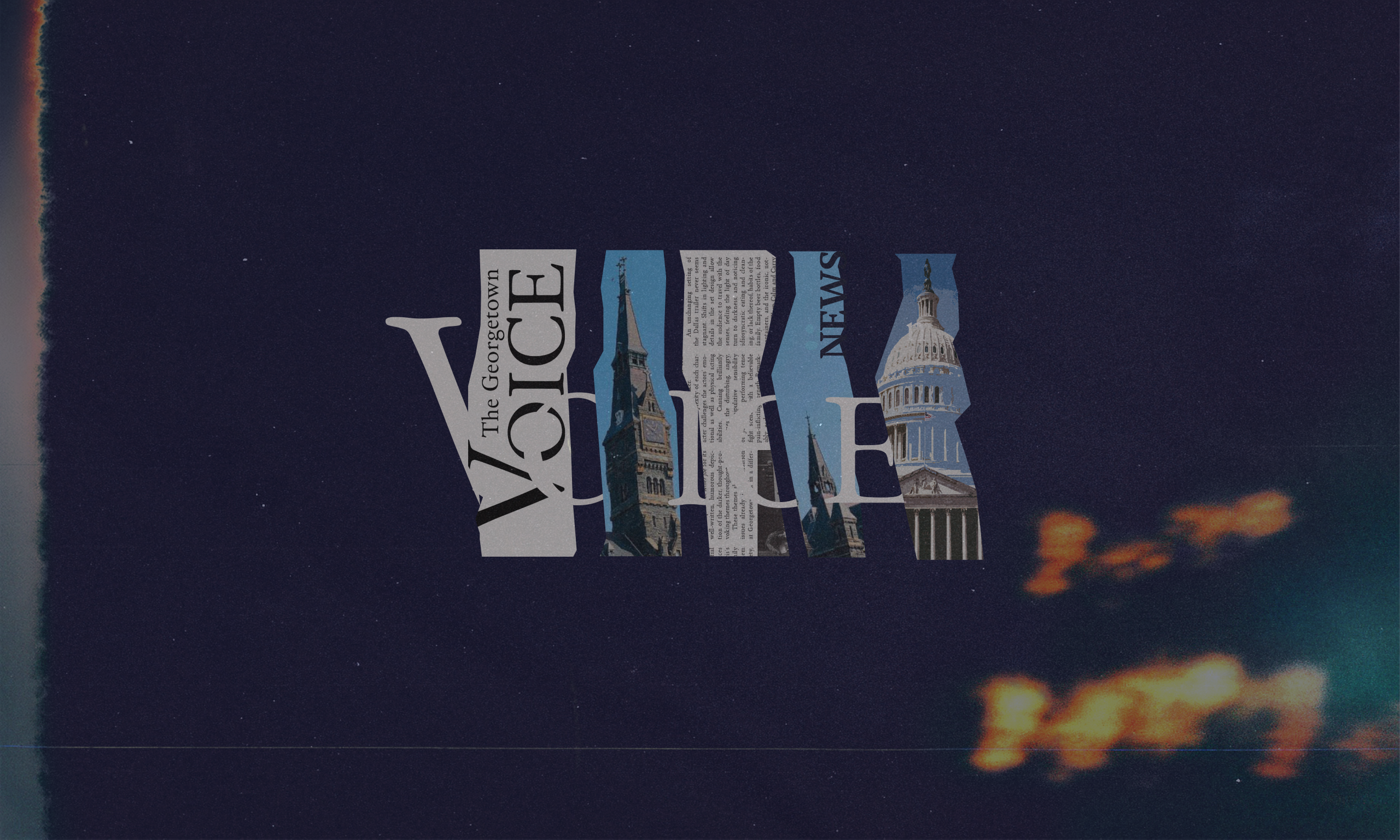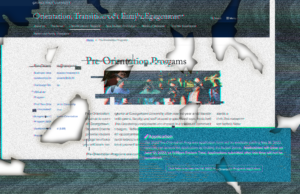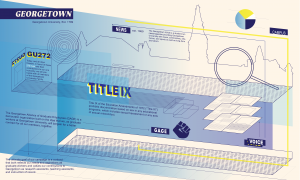More than half a year after releasing a petition calling for the establishment of a Disability Cultural Center (DCC), the students leading the push—and Georgetown’s disabled community at large—have the opportunity to take their advocacy a step further with the Disability Empowerment Endowed Fund.
The fund, housed within the Disability Studies Program, will support a wide array of disability initiatives on campus. These supported initiatives could include fellowships for disabled students to develop research, events hosted by clubs centered around disability on campus, and possibly a DCC.
In order to establish the Disability Empowerment Endowed Fund at Georgetown, however, the community must raise $100,000. And thanks to Tiffany Yu (MSB ’10), the fund is already more than halfway towards that goal.
In January, following the growing support for the DCC petition and positive response from administrators, members of GUSA’s Accessibility Policy Team met with a group of alumni to seek advice on how to go forward with their campaign, according to the team’s researcher, Dominic DeRamo (COL ’23). It was in this meeting, arranged by Professor Libbie Rifkin, founding director of the program until last year, that Yu proposed the idea of an endowment fund. “Tiffany, kind of unexpectedly, offered to provide us with a $50,000 donation to start an endowment that could partially fund the center,” DeRamo said in an interview with the Voice.
For Yu, the idea for such a fund dated back multiple years. In 2017, she floated the concept on Facebook, and after garnering positive feedback, Yu took up the issue with Georgetown’s Office of Advancement. After going back and forth with the university that year, the scholarship eventually fell by the wayside, in part because the university at the time was uncomfortable with the name “Disability Scholarship Fund.”
“I spent 12 years not really feeling an affinity with the word [disability], and now I want to just shout it from the rooftops,” Yu said in an interview with the Voice. “So much of what I try to get across in my work is that we need to unlearn that disability equals bad or that disability equals broken or that disability equals less than.”
In considering the scholarship back in 2017, Yu consulted current professor, activist and alum Lydia X. Z. Brown (COL ’15) on the naming. Four years later, when Rifkin assembled a group of disabled alumni to advise the DCC campaign, Yu and Brown would be among those asked to assist.
Following reconnecting with the other alumni during the pandemic, Yu said, “I started to think more seriously again about what an endowment fund might look like.”
It was during that DCC meeting while discussing how current Georgetown students could continue their own disability activism that Yu offered $50,000 to start the endowment. “I’m not quite sure why it came out of my mouth, but Diversability and my voice within the disability community, all of that was seeded at Georgetown.”
“None of this would be possible if it were not for Tiffany and we are so incredibly grateful for her and her generosity,” DeRamo said of Yu’s donation. “We are just so incredibly excited to see this project moving forward.”
Before coming to Georgetown, Yu didn’t have an affinity with the label “disability.” It wasn’t until her senior year, during an RA training exercise, that she realized how much of her social identity was contingent upon her disability. “I had spent the first 12 years after I became disabled not really knowing that I could be proud in that identity,” she said. In 2009, she created Diversability, a campus club that evolved into the company where she now serves as founder and CEO.
An entrepreneur and advocate for inclusion and empowerment, Yu has a large following and has worked to foster a community openly discussing disability. Her Instagram combines the informational and personal as she uses the platform to share her own experience as a disabled woman of color and educate others on how to be a better ally to disabled people (she recently reached Day 118 of “The Anti-Ableism Series,” documenting how air travel is often ableist).
On June 15, Yu shared the news of the Disability Empowerment Endowed Fund, explaining that she had been dreaming of a disability fund like this since 2017 and emphasizing the fund would support “disability initiatives in perpetuity.”
Once the endowment is fully funded, only small portions of it are accessible at a time. “You can only access five percent of the funds every year, and we are hoping that we can use five percent of the endowment to offset some of the programming costs of the Disability Cultural Center,” DeRamo said. “The Disability Empowerment Endowed Fund is not dedicated to the Disability Cultural Center; it is dedicated towards disability-related initiatives on campus, and we hope that the Disability Cultural Center will be a part of that.”
By investing her money into an endowment rather than a donation, Yu is ensuring that Georgetown commits itself to long-term disability work even beyond a DCC. “An endowment is different from a donation. An endowment says we need a permanent place for Georgetown to be reminded that disability is important,” Yu said. “A 50k donation is cool—I mean that that may be more meaningful for a Disability Cultural Center now—but having an endowment fund that exists forever? That’s how you create real legacy and real change.”
“I would love to see Georgetown become a place that does really feel like they are in alignment with their values if they are a campus that celebrates diversity,” Yu added.
To those involved, Georgetown’s commitment to this fund shows a step towards a true dedication to disability justice and the university’s disabled students.
Georgetown has set up a website page that includes a two-pager explaining the fund and its history, as well as the link to donate money to the fund. In encouraging donations to the endowment, Georgetown uses language to align the university’s values with disability justice.
“The University is demonstrating its commitment to disability empowerment and culture by prioritizing the Fund in its development efforts,” Rifkin, who works in the Disability Studies Program and is special advisor for disability to the VP of diversity, equity and inclusion, wrote in an email to the Voice. “I’m thrilled that the administration recognizes the breadth of the disability community and sees the potential in engaging alumni and other prospective donors around disability culture.”
The continued momentum for both the fund and the campaign for a permanent center demonstrates the weight disability justice carries at Georgetown and beyond in this moment.
“How many Georgetown initiatives are there where people who have no relationship to the university, yet they are eager to donate? To me, this shows that this project is bigger than our university,” Gwyneth Murphy (SFS ’23), GUSA’s accessibility coordinator and a member of the Accessibility Policy Team, wrote in an email to the Voice. “It represents a historic change that is sweeping the nation to redefine the disabled experience and what access and inclusion means.”
According to Nesreen Shahrour (NHS ’23), chair of the Accessibility Policy Team, the results from the 2020 Cultural Climate Survey paint a picture of a university where disabled students feel disenfranchised from community culture. “We’re talking about 77.8 percent of all respondents believe that Georgetown’s campus is not physically accessible to students with disabilities,” Shahrour said.
The survey pointed to issues with Georgetown’s existing services as well, with 67.8 percent of respondents believing that Counseling and Psychiatric Service (CAPS) did not address their needs sufficiently and 24.7 percent of all respondents believing that the Academic Resource Center (ARC) did not address their needs sufficiently. These issues are not new. Georgetown has a history of not prioritizing resources that are critical for the school’s disabled community, a history that necessitates a DCC and an endowment dedicated to disability initiatives. The Disability Studies minor was only established in 2017, centers like the ARC have been understaffed and fall short of student need, and accommodations for students have repeatedly not been respected or implemented.
And, according to Shahrour, 12.8 percent of survey respondents identified as having a disability at Georgetown.
On June 17, the campaign for a DCC at Georgetown’s Instagram announced that the Disability Empowerment Endowed Fund was officially open for donations. To encourage their followers to donate to the fund, the team posted a virtual donation bingo board with the hopes of raising $1,000 in July. In the first two weeks, the effort raised $540.
Along with promoting the fund and encouraging donations, the DCC campaign’s Instagram utilizes the platform to share information about disability at Georgetown, with infographics about Catholicism and ableism, the results of the 2020 Cultural Climate Survey as it pertains to disability on campus, and more. The team has already begun to do the work of a DCC by focusing efforts on changing the disability culture on campus.
“The whole part of the Disability Cultural Center is the cultural part,” Ace Frazier (MSB ’23), a member of the Accessibility Policy Team, said in an interview with the Voice. As part of their developing work for a DCC and their ongoing campaign, the team has been pushing to educate the Georgetown community on disability culture and its importance, while also learning themselves.
“We’ve been doing a lot of research on resources we can share and starting to do the work of a Disability Cultural Center ahead of time,” Frazier said. “It’s really exciting also just getting to learn about disability culture ourselves, ‘cause even though I consider myself to be disabled, it’s still something that I’m constantly getting the chance to learn more about.”
With the institutional support for the endowment, the promise of a DCC seems brighter as Georgetown commits to prioritizing disability. “Along with the Disability Studies Program, a DCC would help educate the Georgetown community about the rich history, culture, and lived experience of disability,” Rifkin wrote. “Along with such centers as the LGBTQ+ Center, the Women’s Center and the Center for Minority Equity and Access, it would support Georgetown’s whole institution approach to fostering a fully accessible, diverse, and equitable community.”
Additionally, if Georgetown were to create a DCC, it would be not only the first Jesuit university to do so, but the first Catholic one as well. “This is still a monumental opportunity for Georgetown to be leading disability justice in higher education across the country, and that has not changed since we started this campaign,” DeRamo said.
The team also stressed the center would go a long way in improving the disabled experience at Georgetown.
“One of the hopes that I have for the Disability Cultural Center is just the chance to bring in disabled students ahead of time, once they’ve been accepted, and show them that Georgetown cares, or that they have a community here,” Frazier said. In foundational planning for the DCC, Frazier added it’s one of their hopes that the DCC can provide a space for new students to talk about disability and be aware of the resources Georgetown has to offer.
“I just want to feel like I belong just as much as everybody else does and the best way to do that is to just show up,” Frazier said. The team leading the push for a DCC envisions it as a space for exactly that: improving community culture and making a public commitment to support students with disabilities.
“It’s important for everyone to remember that we’re only as strong as all of us,” Frazier added.
According to DeRamo, the easiest way to support the campaign’s work is to donate to the endowment and share the donation link. Anyone can donate, he stressed, and they can donate any amount. “With the endowment, these funds will last for years to come so even if people can only donate a small amount it will go a long way and will be greatly appreciated,” he said.
Shahrour reemphasized the broader importance of access to these resources, not only for the disabled community on campus, but for each student, staff, and faculty member. “We can flourish in our society, in our culture, only when we make every member of our society feel valued and celebrated and this is why it’s so important,” Shahrour said. “People with disabilities have long been disenfranchised from society for many, many years and now this is our opportunity.”




